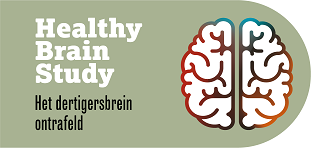Nijmegen Campus unravels the thirty-something brain

The Healthy Brain Study will investigate which social, biological and ecological factors influence the brain. Scientists can use the results to initiate new studies that aim to solve social questions and issues. How does what I eat affect my mood and my decision to buy a new car? What influence does a lot of sitting and sleeping have on my ability to withstand stress or to control aggression? How can I identify and prevent an upcoming burnout? By answering such questions, researchers at the Radboud Campus, including the Max Planck Institute, aim to learn how people can become happier, fitter and more self-reliant.
A thousand volunteers in their thirties
Researchers aim to follow and test a thousand people in their thirties from Nijmegen for a year to mid-2022. Project manager Lucy Overbeek: “We chose people in their thirties because their brains have fully developed, but haven’t begun aging yet. Moreover, this group often has to deal with important life events, such as career changes, a burnout, buying a house, having children or experiencing a divorce. These are all factors that influence their well-being.” The Healthy Brain Study researchers are looking for Nijmegen residents in their thirties from all walks of life. “In this way we can draw better conclusions about the general population", says Overbeek. If you’re interested in taking part and Dutch speaking, pre-register via www.dertigersbrein.nl.
Measurements
Participants will be followed in their daily lives for a year during which time they will be tested periodically on the Radboud Campus. Testing will happen at three different moments in the year, giving researchers insight into how people's feelings, thoughts and actions fluctuate over time. Participants will wear activity meters at home for three weeks and complete questionnaires. They will undergo tests three times a year on the Nijmegen campus varying from brain-scans, fitness tests, blood tests and questionnaires on, for example, depression.
Team science
Unique about the Healthy Brain Study is that scientists from different disciplines will try to improve our understanding of the brain. Professor of Cognitive Neuroscience and project leader Guillén Fernández: “I hope that the data we collect will inspire scientists and students to look beyond the boundaries of their own field. Team science is based on the idea that groups of scientists from different disciplines, e.g., social sciences, health sciences or management sciences, work together during all stages of a scientific project. This starts with asking the right questions and carries on up to and including the writing of scientific publications. This approach is the next step in better understanding the human brain.”
About Radboud University
Radboud University is a broad, internationally and student-oriented research university. Together with Radboudumc, we create an intellectual climate that inspires and challenges our employees and students. Radboud University is guided in its core tasks of research and education by scientific curiosity and societal need. This approach results in achievements that advance science and benefit humanity.
About Radboud university medical center
Radboud university medical center (Radboudumc) specializes in patient care, scientific research, teaching and training, based in Nijmegen. We aim to be pioneers in the development of innovative, sustainable and affordable healthcare. Our mission is: ‘to have a significant impact on healthcare’. We do this in a person-centered and innovative way and in close collaboration with our network. Every day more than 11,000 employees and more than 3,000 students work on the future of healthcare and medical sciences. Scientific research is concentrated in three research institutes (Radboud Institute for Molecular Life Sciences, the Radboud Institute for Health Sciences and the Donders Center for Medical Neuroscience), each with a dedicated Graduate School. Together they cover 18 multidisciplinary research themes.
About the Max Planck Institute for Psycholinguistics
The Max Planck Institute (MPI) in Nijmegen is the only institution in the world that devotes itself entirely to psycholinguistics: research into how we produce and understand language and how we learn these skills as first or second language acquirers. The institute has close ties with the Donders Center for Medical Neuroscience in Nijmegen.
The MPI is part of the German Max Planck Society, a large organization dedicated to fundamental research in all fields of science.
Share this page